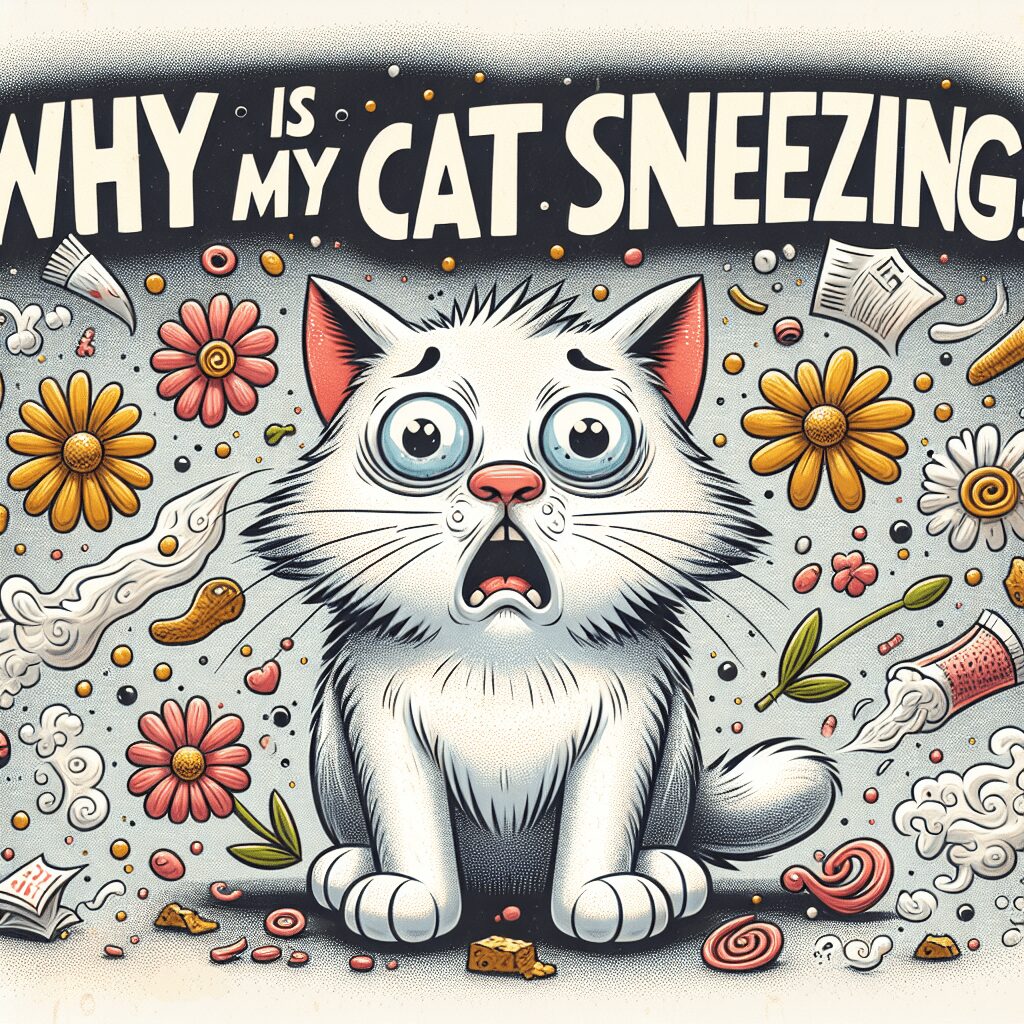Cat owners often witness their feline companions sneeze now and then, leading to a wave of concern. It’s understandable; people treasure their cats and want to keep them healthy. The sneezing can range from an occasional puff to more frequent episodes that might raise eyebrows. Understanding the reasons behind feline sneezing can be a rewarding journey. By exploring the reasons, potential concerns, and solutions, you not only keep your bond with your pet strong but also ensure they lead a comfortable life.
Overview of Sneezing in Cats
Sneezing acts as a natural defense mechanism against irritants in the nasal passage. In cats, it can signal allergies, infections, or environmental irritants. As devoted pet parents, recognizing the difference can help interpret your cat’s sneezing behavior correctly. Light sneezing with no other symptoms often doesn’t warrant alarm and can simply indicate a reaction to something like dust in the air. On the other hand, frequent sneezing or the presence of other symptoms may prompt a trip to the veterinarian.
Features of Feline Allergies
Several features distinguish feline allergies from other causes of sneezing. Understanding these can significantly aid in identifying the problem. Here are some of the key features:
- Frequency: Allergies often cause sporadic sneezing episodes.
- Duration: Sneezing may last during allergy seasons or after exposure to irritants.
- Accompanying Symptoms: Look for signs like watery eyes, runny nose, or skin irritation.
- Behavioral Changes: If your cat is unusually lethargic, it may indicate a more serious issue.
- Trigger Identification: Certain environments or products may lead to increased sneezing.
- Seasonal Timing: Allergies may correspond with specific times of year, like spring.
- Response to Medication: Typically, antihistamines will lessen allergy symptoms.
- Sound of Sneezing: Allergic sneezing may have a different sound than sneezing due to illness.
- Nasal Discharge: Clear discharge often aligns with allergies, while colored discharge might indicate infection.
- Previous Allergy History: Any known allergies in the past put your cat at a higher risk.
Why Is My Cat Sneezing?
Various factors contribute to sneezing in felines. The reasons often include:
- Environmental Allergens: Dust, pollen, mold, and even certain chemicals can trigger allergies.
- Food Allergies: Certain ingredients in your cat’s food may lead to sneezing, often accompanied by digestive issues or skin reactions.
- Respiratory Infections: Viruses and bacteria can lead to upper respiratory infections, often showcasing similar symptoms.
- Irritants: Cigarette smoke, strong perfumes, or cleaning products pose risks to your cat’s nasal comfort.
- Feline Herpesvirus: This common virus in cats can cause sneezing and other respiratory symptoms, especially in young or unvaccinated cats.
- Nasal Polyps: Growths in the nasal passage can obstruct airflow and cause sneezing.
- Stress: Emotional responses to changes in the environment can lead to unexpected sneezing.
- Changes in Diet or Lifestyle: New foods or a sudden change in surroundings may prompt allergy symptoms.
Who Is Affected by Cat Sneezing?
Not just cats, but everyone in the household can be impacted by a cat’s sneezing.
- Other Pets: Other pets may also develop allergies by coming into contact with similar irritants.
- Children: Little ones may be particularly sensitive to allergens within the home environment.
- Elderly Family Members: Older adults often have weakened immune systems, making them more susceptible to respiratory issues.
- Allergy Sufferers: Individuals with pre-existing allergies may experience intensified symptoms due to cat allergens.
- Vets and Pet Care Providers: They observe these reactions frequently and can provide insight on care and treatment.
What to Do When Your Cat Sneezes
Observation is key when it comes to feline sneezing. If a cat’s sneezing escalates or includes other concerning symptoms, taking action is essential:
- Monitor Symptoms: Keep a watchful eye on your cat’s behaviors and symptoms.
- Create an Allergy Diary: Document when your cat sneezes, what they were exposed to, and any other symptoms noticed.
- Consult Your Veterinarian: Involve a professional if sneezing persists or worsens. They can determine if further examination or treatment is needed.
- Consider Allergies: Discuss potential allergy testing if your vet suggests it.
- Environmental Control: Address allergens in your home by minimizing dust and using air purifiers.
- Hypoallergenic Products: Opt for cleaning supplies and cat foods free of specific allergens.
- Medications: Discuss antihistamines or specific treatments with your vet to alleviate allergies.
Where to Seek Help
Your veterinarian serves as the primary source for diagnosing and treating sneezing in cats. If your cat shows concerning symptoms, think about:
- Local Animal Hospitals: Seek out facilities with expertise in feline health.
- Emergency Vets: Prioritize emergency services for sudden, severe reactions.
- Specialists: Allergists for pets can help tailor treatment plans to your cat’s needs.
- Online Resources: Websites dedicated to feline health can provide valuable information.
When Is It Time to Be Concerned?
While occasional sneezing in cats is often harmless, certain situations demand immediate attention:
- Persistent Sneezing: If your cat sneezes multiple times daily without relief.
- Colored Nasal Discharge: Indicates possible infection requiring treatment.
- Loss of Appetite: If your cat is not eating or drinking normally.
- Behavior Changes: Call your veterinarian if your cat seems more irritable than usual.
- Breathing Difficulties: Labored breathing warrants quick action and consultation.
How to Help Your Sneezing Cat
Taking a proactive approach can greatly improve your cat’s health. Consider:
- Regular Veterinary Check-ups: Ensure your cat is up to date on vaccinations.
- Allergen-Free Environment: Create a home free of dust and irritants.
- Nutritional Adjustments: Feed quality cat food to support immune health.
- Hydration: Keep fresh water available to help thin mucus.
- Indoor Living: Limit outdoor exposure to minimize pollen and dust contact.
Pros and Cons of Treating Cat Allergies
Choosing methods to treat your cat’s allergies comes with benefits and drawbacks. Here’s a balanced view:
Pros:
- Improved comfort for your cat.
- Reduction in allergy symptoms.
- Enhanced quality of life.
Cons:
- Potential side effects from medications.
- Time-consuming allergy testing may be needed.
- Lifestyle changes for the household.
FAQs
1. Can I give my cat antihistamines over the counter?
Always consult your veterinarian before giving any medication to your cat, including antihistamines.
2. How can I tell if my cat has an allergy?
Watch for recurring sneezing, itching, or skin irritation, and consult your vet for guidance.
3. Can cat sneezing indicate a serious illness?
While many cases are benign, persistent or severe symptoms may indicate infections or respiratory issues.
4. Is it safe to use air fresheners around cats?
Many air fresheners can irritate your cat’s respiratory system. Opt for natural alternatives.
5. What foods can cause allergies in cats?
Common allergens include certain proteins like beef, dairy, or fish; check with your vet for a tailored diet.
Disclaimer: As an Amazon Associate, I earn from qualifying purchases. I may earn a commission from qualifying purchases as an affiliate. Please note that I only recommend products I believe will provide value to my readers.









